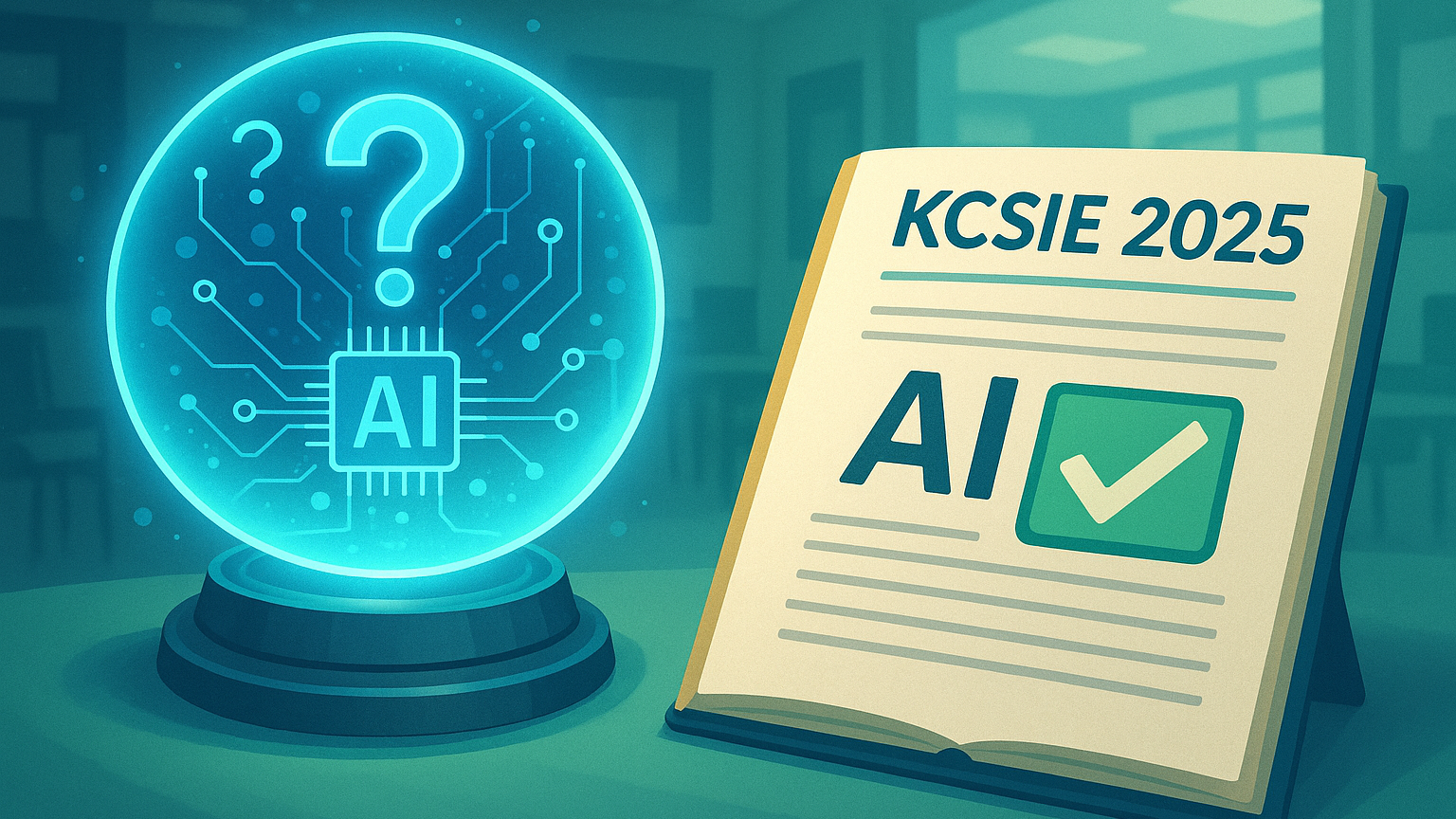KCSIE 2025: What We Got Right (and What We Didn’t) About AI and Safeguarding
When we published our forecast on how KCSIE 2025 might address Artificial Intelligence, we speculated that the Department for Education was poised to...
7 min read
 9ine
:
July 25, 2025
9ine
:
July 25, 2025

June 2025 saw a change to the data protection landscape in the UK, with the Data (Use and Access) Bill becoming law, to update the UK GDPR and Data Protection Act 2018. Whilst highlighting the importance of considering children’s needs in relation to online services and the need to have ‘humans in the loop’ for automated decisions, the DUAA also reduces some administrative burdens for schools. In this article we take a look at some of the key changes under the Act, how these impact schools and EdTech Vendors, and how 9ine can help, including with our upcoming webinar which you can register for here.
Children and Online Services
The need for online services to explicitly take children’s needs into account is clearly established under the Data Use and Access Act (DUAA). If an organisation provides an online service which is likely to be accessed by children, they must take their needs into account when deciding how to collect, use and share their personal data. As well as putting in place robust technical and organisational measures that reflect the unique needs and vulnerabilities of children, EdTech vendors providing online services will need to consider:
For EdTech Vendors, conforming to the Age Appropriate Design Code is a strong indicator of compliance. But, to go one step further, and give yourself a competitive edge, 9ine’s Certified Vendor Programme is a comprehensive way for EdTech Vendors to demonstrate their commitment to data privacy, AI and cyber security compliance to schools. 9ine’s certification instills confidence, and supports EdTech vendors to navigate the complex maze of AI, data protection and cyber security laws and requirements, including the new requirements of the DUAA . If you want to know more about the programme please contact us.
For schools, ensuring that the EdTech Vendors that you use meet their data privacy, AI and cybersecurity requirements is a must. If they have participated in the Certified Vendor Programme then you can be confident that they have been vetted for compliance and meet the requirements under the DUAA. For those that haven’t yet, we also have Vendor Management, including Vendor Library, which allows you to continuously monitor EdTech vendors for compliance. With Vendor Library, 9ine take away the pain of burdensome and continuous manual reviews, which schools would need to complete to ensure compliance. We do the due diligence, highlight the risks, but also the safeguards that you need to put in place to use an EdTech Vendor, including highlighting whether they are meeting the new DUAA requirements. If you want to know more about Vendor Management you can contact us here.
Automated Decision-Making
With Artificial Intelligence being increasingly used in Education, requirements on automated decision-making (ADM) are an important consideration. Whether you are using ADM to automatically grade assessments or to sift through CVs and applications, the DUAA now defines an automated decision as one made without ‘meaningful human involvement’.
Under the DUAA, a ‘significant decision’ is one made solely by an automated process (without human involvement), and cannot be based on special category data (e.g. data revealing racial or ethnic origin, political opinions, health data etc.) unless one of these strict conditions is met:
A decision is ‘significant’ if it:
In some ways, the DUAA has relaxed the rules around Automated-Decision Making, allowing it to be used based on legitimate interests in many cases, but not where sensitive or special category data is involved without one of the above conditions being met. However, wherever schools and EdTech Vendors are using ADM to make significant decisions, they must still have a number of safeguards in place, these include:
For schools, a key part of meeting these requirements will be to make sure that your staff have the knowledge they need on AI, data privacy and cyber security to have meaningful involvement in automated decisions, enabling them to reconsider outcomes and respond to challenges to decisions.
To make sure that your staff are empowered to be the ‘humans in the loop’ required to take on these tasks, 9ine’s Academy LMS can support you. This is our online digital learning and certification platform, which offers pathways in AI, Privacy and Cybersecurity across four levels (Beginner, Intermediate, Advanced and Specialist). Our AI Pathway offers over 20 courses on AI in Education and can help schools to ensure that their staff have the knowledge they need to have meaningful involvement in automated decisions made using AI.
Scientific Research and Purpose Limitation
Under the DUAA, the rules around consent for research have been refined, as have the rules on when EdTech Vendors would be able to use personal data collected for one purpose for another one. The DUAA makes it clear that organisations can use personal data for scientific research, even when it was originally collected for another purpose, although if the data was collected based on the individual’s consent, then they will need to meet stricter requirements to reuse the data. What makes this relevant is that scientific research is now defined broadly to include privately and publicly funded research, and research for commercial or non-commercial purposes.
This means that it is possible for an EdTech Vendor, service provider or online platform to reuse student and staff data for scientific research, as long as safeguards are in place and new consent isn’t practical. However, this will only be the case if the EdTech Vendor or third party is acting as a data controller in their own right. For schools, this makes it important to ensure that you have agreements or contracts which place obligations on the vendor to ensure that they only act as a data processor and only process the data in the way the school gives them instructions to do.
Contracts and agreements are also something we review as part of our Vendor Library, to check that the appropriate ones are in place between schools and EdTech Vendors to protect personal data (or to highlight where they are not).
How is the DUAA reducing the administrative burdens on schools?
It is not all additional requirements under the DUAA though, and in a number of ways the DUAA actually reduces some of the requirements for UK schools. These include requirements around cookies, data subject rights and legitimate interests.
Cookies
In relation to cookies, the DUAA recognises that some cookie-type activities are either essential or non-intrusive, and expands the exceptions where consent is not required, including where the storage or access is:
For schools, this means that if your website uses cookies, there are more types of cookies that can be used without you needing to get consent from the user.
Data Subject Rights
The DUAA now confirms that the right of access (one of several key rights that individuals have over their personal data) now only extends to personal data that schools are able to provide following a reasonable and proportionate search. This means that schools are not expected to conduct exhaustive or burdensome searches, especially where the data is stored across multiple systems or in a form that is not readily accessible. This means that schools may be able to refuse or narrow Subject Access Requests (SARs) if the information is stored in legacy systems or would take excessive time and resources to retrieve.
Legitimate Interests
Schools and EdTech Vendors should only be processing personal data under one of six lawful bases, one of which is that you have a legitimate interest in processing the personal data concerned. The DUAA gives clear examples of purposes that legitimate interests can be used for, including direct marketing and network and information security measures. Additionally, the Act highlights a number of purposes where there is no need to carry out a formal legitimate interests assessment, as long as the processing is necessary to achieve the purpose. These include:
This means that under the DUAA, schools can more confidently rely on legitimate interests in a number of areas, particularly when it comes to safeguarding and child protection.
How else can 9ine help us?
It is clear that the DUAA has given EdTech Vendors and schools more responsibilities, but it has also clarified existing ones and reduced several burdens in many ways. In addition to our Certified Vendor Programme, Vendor Management and Academy LMS, at 9ine we also offer:
Webinar alert: 9ine are hosting a webinar on Tuesday 26 August 2025 at 10:30am BST on ‘KCSIE, DUAA and GenAI: Through the acronyms to actions’, in which we will go through these and other changes under the DUAA in more detail, as well as other changes under the latest draft of Keeping Children Safe in Education and the European Commission’s General-Purpose AI Code of Practice, providing schools with practical steps to meet the requirements. You can sign up to attend here:
9ine company overview
9ine equips schools to stay safe, secure and compliant. We give schools access to all the expertise they need to meet their technology, cyber, data privacy, governance, risk & compliance needs - in one simple to use platform. For additional information, please visit www.9ine.com or follow us on LinkedIn @9ine.

When we published our forecast on how KCSIE 2025 might address Artificial Intelligence, we speculated that the Department for Education was poised to...

KCSIE is due to be published soon and, according to sources, is expected to undergo a significant upgrade, potentially even a complete rewrite. In...

In 2025, schools in England face a convergence of new safeguarding requirements and data protection laws as artificial intelligence (AI) becomes...